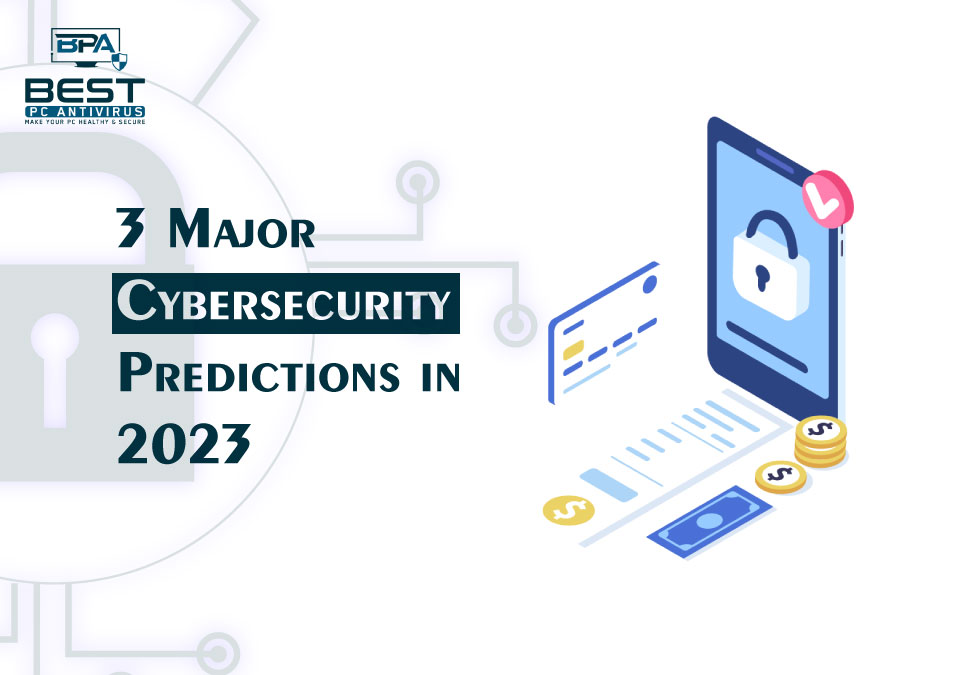While these trends may appear frightening, there are simple steps you can take to protect yourself, your loved ones, and your business. Major Cybersecurity
Traditionally, the end of the year is a time of reflection. It’s also a time of year-end predictions in many industries, including cybersecurity and online privacy. Ransomware will become a more serious problem, scams will remain a popular method for cyber criminals, and cybercrime as a business will become even more sophisticated.
Ransomware is getting worse
As cybercriminals used phishing attacks and other social engineering techniques to gain access to the systems of both public and private organisations in 2022, ransomware remained a profitable crime. No one seemed safe, from hospitals to large corporations to individuals.
“We saw cybergangs threaten to publicly publish their targets’ data if a ransom isn’t paid this year, and we expect this trend to continue in 2023,” says Michal Salat, Threat Intelligence Director at Avast. “This puts people’s personal memories at risk and poses a double risk for businesses. The loss of sensitive files, as well as a data breach, can have serious ramifications for their business and reputation.”
Salat and his team anticipate a continued rise in this type of attack in 2023.
Scamdemic 2022 is now Scamdemic 2023.
Everything from romance scams to Covid-19 scams to tech support scams and more proliferated during the 2022 “Scamdemic,” as cybercriminals went after individuals worldwide. This could be because software solutions to combat cybercrime become more sophisticated, making people easier targets than devices.
“We’ve been living in a scamdemic for a while now, and there’s no sign of it slowing down,” Salat says. “Cybergroups go to great lengths to exploit people’s worst fears in order to trick them into sending money or disclosing personal information because it is easier to make people vulnerable than it is to hack their devices.”
Salat anticipates some relative newcomers to the field in 2023, in addition to the plethora of scams seen in 2022.
“We expect to see attacks next year that play on people’s economic and environmental concerns,” Salat says. “Scammers are not only flooding people’s inboxes with phishing emails, but they are also bombarding people’s text messaging apps and keeping their phones ringing.”
Cybercriminals are becoming more sophisticated.
We’ve said it before and will say it again: cybercrime is primarily a business. It evolves and changes, just like non-criminal industries. We saw increased professionalisation in 2022 with the formation of conglomerates and even a ransomware group offering a bug bounty programme. Perhaps more concerning is the intrusion of cybercriminal recruiting into areas where young people congregate.
“We’ve seen open-source malware become more readily available and distributed on platforms like Discord for years,” Salat says.
“People, including young people with less technical knowledge, can now obtain malware and, given current economic hardships, may be more inclined to join the dark side.”
Cybercriminal organisations have also begun to pay ordinary people to participate in their crimes, a trend Salat expects to continue in 2023.
“We’ve also seen criminal organisations recruit and pay people to carry out DDoS attacks or instal ransomware on their employers’ devices,” Salat says.
Not only will we see more malicious activities as a result of software as a service, the distribution of software for DDoS attacks, and easily accessible open-source malware, but this could be a stepping stone to a career as a cybercriminal.”
While these trends may appear frightening, there are simple ways to protect yourself, your loved ones, and your business. Here are our top tips for avoiding being scammed or becoming a victim of ransomware.
How to Protect Yourself from Fraud
- Before making a purchase, do your homework on companies and websites. Do your research first, no matter how urgent the offer appears to be or how badly you want the item or service. Read the website’s corporate information, terms of service, and privacy policies — many scam websites will only provide basic versions, if any at all. Look up customer reviews to see what others are saying.
- Pay using a credit card or a reputable payment processor. Credit cards are far more secure than debit cards and bank transfers. When it comes to fraud, your credit card company is on your side. Chargebacks are your friend when you’ve been taken advantage of.
- Avoid using links and downloading files. Scammers can infect your computer with malware by using attachments and websites. Trojans, for example, frequently infiltrate your device while masquerading as harmless attachments, and these Trojans can then bring rootkits, spyware, or adware with them. Some malware will simply display advertisements, while others can be far more dangerous.
- Protect yourself online. Use two-factor authentication.
- Personal information should be kept private. How many websites require you to answer a series of security questions in order to recover your password? Remember which information you’ve designated as secure, and don’t share it. Otherwise, scammers can easily answer your security questions. Of course, this also applies to login information and account numbers. Major Cybersecurity Major Cybersecurity Major Cybersecurity
- Authentication if it is available on a website. It isn’t perfect, but it’s better than nothing. Use strong, unique passwords on websites you visit, and store them more securely with a trustworthy password manager. Major Cybersecurity Major Cybersecurity Major Cybersecurity
How to Aid in the Prevention of Ransomware
- Maintain software updates. Making sure your operating system and apps receive new updates as soon as they are available will close security gaps and prevent hackers from using exploits to deploy ransomware.
- Backup your system on a regular basis. Ransomware typically gains power by preventing access to critical files. Your chances of losing the files to ransomware are reduced if you have them safely backed up elsewhere. Backup your system and files on a regular basis — cloud services and physical storage are both viable options, and you should use both if possible. If your device allows you to schedule automatic backups, do so.
- Install an ad blocker. Install an ad blocker in your browser to protect yourself from malvertising and drive-by downloads, two ad-related ways ransomware can enter your system.
- Be cautious. Be cautious of unusual links sent via email or other messaging platforms. Even if the link comes from someone you know, it is possible that they have been hacked. Understand the warning signs of unsafe websites and avoid visiting them. Major Cybersecurity Major Cybersecurity Major Cybersecurity
- Use an antivirus programme. Ransomware can only cause harm if it is able to reach you. Use a strong cybersecurity app that helps to prevent malware and viruses from reaching you. Major Cybersecurity
Read More : Is browsing in Private Truly Private?




